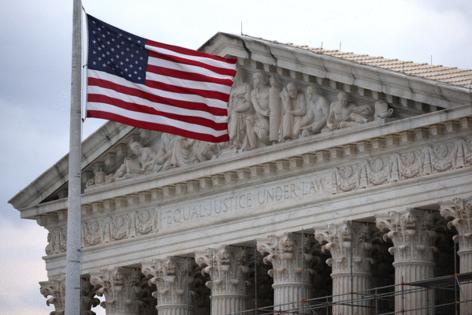Supreme Court to decide legality of transgender sports bans
Published in News & Features
WASHINGTON — The Supreme Court announced Thursday it will decide the legality of bans on transgender athletes’ participation in women’s sports, taking on a contentious cultural issue and potentially opening the door to Republican efforts to implement such bans nationwide.
The justices agreed to hear arguments in two cases, originating from challenges to state laws in Idaho and West Virginia, about whether such bans would violate federal civil rights laws or the Equal Protection Clause of the 14th Amendment to the Constitution.
About two dozen states have laws limiting the ability of transgender women to participate in women’s sports, while the Trump administration and congressional Republicans have sought to use federal funding to curtail policies that allow it.
The Supreme Court will hear arguments in the case in the term that starts in October, and likely issue decisions by the conclusion of the term at the end of June.
In the Idaho case, the state asked the Supreme Court to weigh in after the U.S. Court of Appeals for the 9th Circuit tossed the state ban in a decision last year. In the West Virginia case, a divided panel of judges at the U.S. Court of Appeals for the 4th Circuit tossed the state ban as well.
In its petition for the Supreme Court to take the case, West Virginia argued that the state law hinged on “biological sex” and was in line with decades of practice by states and the federal government to segregate sports by gender.
“Recognizing these common-sense ideas, courts across the country have found for decades that men and women may be constitutionally separated by biological sex when it comes to sports,” the petition said.
West Virginia Attorney General John “JB” McCuskey praised the Supreme Court’s decision to hear the case in a statement Thursday.
“It’s a great day, as female athletes in West Virginia will have their voices heard. The people of West Virginia know that it’s unfair to let male athletes compete against women; that’s why we passed this commonsense law preserving women’s sports for women,” McCuskey said.
Tara Borelli, senior counsel for Lambda Legal, an organization representing one of the challengers, in a statement pledged to defend the lower court ruling.
“Our client just wants to play sports with her friends and peers,” Borelli said. “Everyone understands the value of participating in team athletics, for fitness, leadership, socialization, and myriad other benefits.”
President Donald Trump in an executive order in February sought to revoke federal funding from any educational institution that allowed transgender athletes to compete in women’s or girls’ sports.
The executive order has sparked standoffs with multiple states, as the Justice Department has sued Maine to revoke its Department of Education funding for defying the order and announced last month that California is in violation of the order.
The NCAA and several higher education systems have reached agreements with the Trump administration to enforce the executive order. The University of Pennsylvania and Department of Education announced Tuesday the school would ban transgender athletes from women’s sports.
The House passed a bill in January that would prohibit the department from providing funds to programs that allow or support the participation of transgender women or girls in women’s or girls’ sports. A similar measure in the Senate did not clear a procedural hurdle in March on a 51-45 vote, falling short of the 60 votes needed to advance.
The decision to hear the cases comes after the justices ruled last month that state laws banning gender-affirming care for minors did not discriminate on the basis of transgender status.
In that case, Justice Amy Coney Barrett, in a concurring opinion joined by Justice Clarence Thomas, wrote that she did not believe that transgender Americans were part of a “suspect class” that would receive protected status under the 14th Amendment.
The cases are Bradley Little, in his official capacity as Governor of the State of Idaho et al., v. Lindsay Hecox et al., and West Virginia et al., v. B.P.J.
©2025 CQ-Roll Call, Inc., All Rights Reserved. Visit cqrollcall.com. Distributed by Tribune Content Agency, LLC.







Comments